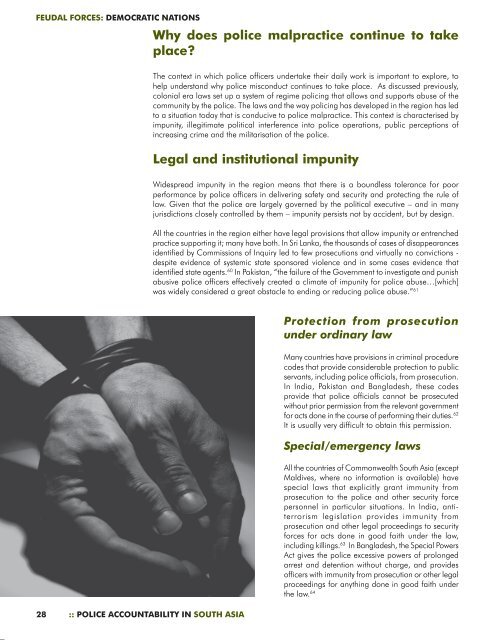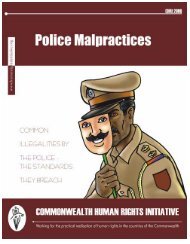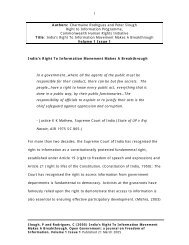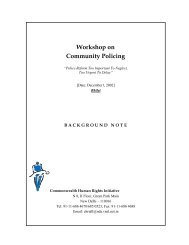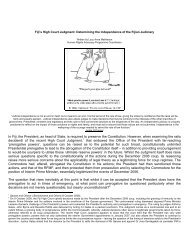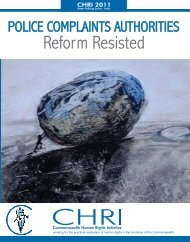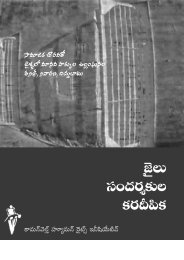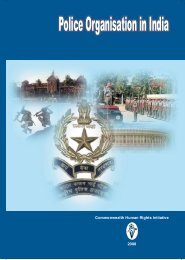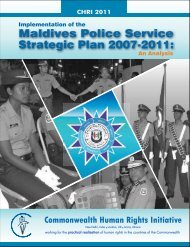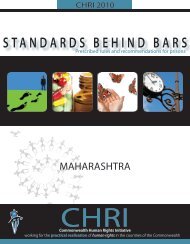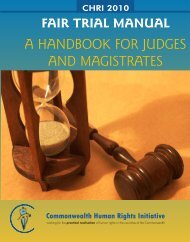Feudal Forces: Democratic Nations - Police Accountability in
Feudal Forces: Democratic Nations - Police Accountability in
Feudal Forces: Democratic Nations - Police Accountability in
You also want an ePaper? Increase the reach of your titles
YUMPU automatically turns print PDFs into web optimized ePapers that Google loves.
FEUDAL FORCES: DEMOCRATIC NATIONSWhy does police malpractice cont<strong>in</strong>ue to takeplace?The context <strong>in</strong> which police officers undertake their daily work is important to explore, tohelp understand why police misconduct cont<strong>in</strong>ues to take place. As discussed previously,colonial era laws set up a system of regime polic<strong>in</strong>g that allows and supports abuse of thecommunity by the police. The laws and the way polic<strong>in</strong>g has developed <strong>in</strong> the region has ledto a situation today that is conducive to police malpractice. This context is characterised byimpunity, illegitimate political <strong>in</strong>terference <strong>in</strong>to police operations, public perceptions of<strong>in</strong>creas<strong>in</strong>g crime and the militarisation of the police.Legal and <strong>in</strong>stitutional impunityWidespread impunity <strong>in</strong> the region means that there is a boundless tolerance for poorperformance by police officers <strong>in</strong> deliver<strong>in</strong>g safety and security and protect<strong>in</strong>g the rule oflaw. Given that the police are largely governed by the political executive – and <strong>in</strong> manyjurisdictions closely controlled by them – impunity persists not by accident, but by design.All the countries <strong>in</strong> the region either have legal provisions that allow impunity or entrenchedpractice support<strong>in</strong>g it; many have both. In Sri Lanka, the thousands of cases of disappearancesidentified by Commissions of Inquiry led to few prosecutions and virtually no convictions -despite evidence of systemic state sponsored violence and <strong>in</strong> some cases evidence thatidentified state agents. 60 In Pakistan, “the failure of the Government to <strong>in</strong>vestigate and punishabusive police officers effectively created a climate of impunity for police abuse…[which]was widely considered a great obstacle to end<strong>in</strong>g or reduc<strong>in</strong>g police abuse.” 6128 :: POLICE ACCOUNTABILITY IN SOUTH ASIAProtection from prosecutionunder ord<strong>in</strong>ary lawMany countries have provisions <strong>in</strong> crim<strong>in</strong>al procedurecodes that provide considerable protection to publicservants, <strong>in</strong>clud<strong>in</strong>g police officials, from prosecution.In India, Pakistan and Bangladesh, these codesprovide that police officials cannot be prosecutedwithout prior permission from the relevant governmentfor acts done <strong>in</strong> the course of perform<strong>in</strong>g their duties. 62It is usually very difficult to obta<strong>in</strong> this permission.Special/emergency lawsAll the countries of Commonwealth South Asia (exceptMaldives, where no <strong>in</strong>formation is available) havespecial laws that explicitly grant immunity fromprosecution to the police and other security forcepersonnel <strong>in</strong> particular situations. In India, antiterrorismlegislation provides immunity fromprosecution and other legal proceed<strong>in</strong>gs to securityforces for acts done <strong>in</strong> good faith under the law,<strong>in</strong>clud<strong>in</strong>g kill<strong>in</strong>gs. 63 In Bangladesh, the Special PowersAct gives the police excessive powers of prolongedarrest and detention without charge, and providesofficers with immunity from prosecution or other legalproceed<strong>in</strong>gs for anyth<strong>in</strong>g done <strong>in</strong> good faith underthe law. 64


